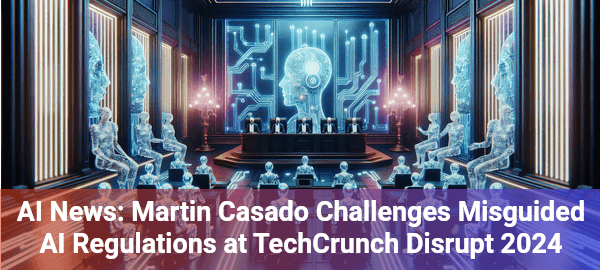AI regulations spark critical debate: Are lawmakers getting it wrong?
In the ever-evolving landscape of technological innovation, a crucial conversation emerges about AI governance. Martin Casado’s insights challenge current regulatory approaches, as explored in our previous exploration of AI’s transformative potential.
As a tech enthusiast who’s navigated complex technological landscapes, I’ve witnessed how misunderstood regulations can stifle groundbreaking innovation—much like trying to conduct an orchestra with mittens on.
Decoding AI Regulation: Martin Casado’s Bold Perspective
Martin Casado from a16z offers a provocative critique of current AI regulation strategies. At TechCrunch Disrupt 2024, he argued that lawmakers are focused on hypothetical future scenarios instead of understanding actual technological risks. His $1.25 billion infrastructure practice has invested in AI startups like World Labs and Cursor, giving him unique insights.
The core issue, according to Casado, is the inability to clearly define AI in proposed policies. When California attempted to introduce SB 1047—a bill proposing a ‘kill switch’ for large AI models—industry leaders like Casado viewed it as potentially damaging to California’s AI ecosystem. He highlighted that such poorly constructed legislation could discourage innovation rather than protect society.
Casado emphasizes the importance of understanding ‘marginal risk’—examining how AI differs from existing technologies like Google or internet usage. He suggests that existing robust regulatory frameworks developed over 30 years are better equipped to address emerging AI challenges than creating entirely new, potentially misguided regulations.
AI Regulation Consulting: Bridging Technology and Policy
Develop a specialized consulting firm that helps policymakers, tech companies, and startups navigate AI regulatory landscapes. Offer comprehensive services including risk assessment, policy drafting, technological impact analysis, and strategic guidance. Revenue streams would include consulting fees, policy workshops, expert testimony, and ongoing regulatory compliance support packages.
Navigating the Future of Responsible Innovation
As we stand at the crossroads of technological advancement, Casado’s perspective challenges us to think critically about regulation. Are we protecting innovation or inadvertently stifling it? Join the conversation—share your thoughts on AI governance and how we can balance technological progress with responsible development.
Quick AI Regulation FAQ
- Q: Why are current AI regulations problematic?
A: They often target hypothetical risks instead of understanding real technological challenges and marginal differences.
- Q: Who should develop AI regulations?
A: Experts in technology, including academics and commercial AI product developers.
- Q: Can existing regulatory frameworks handle AI?
A: Yes, current 30-year-old frameworks can be adapted to address AI’s unique challenges.
